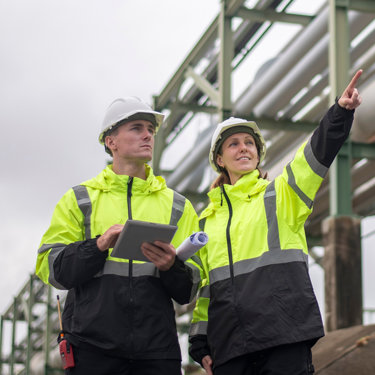Don’t be grounded by a Regulation 61 notice: Helping airport operators comply
Published: 16 May 2024
Are you an airport operator? Have you been served with a Regulation 61 notice and don’t know where to start to ensure compliance? Our environmental experts have many years of experience in delivering surveys, assessments, screening, and monitoring programmes for airports and can help you ensure your facility soars to compliance. We'll explain what a Regulation 61 notice is, how it relates to airports, what information is required, and what you can do to ensure compliance.

What is a Regulation 61 Notice?
A Regulation 61 notice is used by the Environment Agency (or equivalent local agency) to obtain information relating to environmental permits that enforce The Environmental Permitting Regulations 2016. The notice sets out what information is required, combined with a timescale within which it should be provided.
Failure to comply with the notice without a reasonable excuse is an offence under The Environmental Permitting Regulations 2016 and can lead to legal action. In addition, providing information or making statements which are known to be false or misleading is also an offence that could lead to legal action.
In summary, it is something that has to be complied with.
Notice to airport operators
The Environment Agency is currently reviewing airport environmental permits which authorise the discharge of pollutants to water. A Regulation 61 notice has recently been issued to airports that hold environmental permits, requesting additional information on their discharges. These requests are specifically focused on per-and polyfluoroalkyl substances (PFAS), but also request information on other potential pollutants including de-icer, hydrocarbons, herbicides, cleaning products, etc.
Information required
Below is a list of information required and the timescales for supplying that information following the notice being served.
The key is to ensure all information provided is accurate and completed within a tight timescale to avoid any legal action. If no action has been taken so far, then it should be started urgently.
|
Information requested |
Detail |
Timescale (after serving notice) |
|
Site survey |
Site survey to inform the permit to discharge, including a review of site history, drainage plans, details of current permits, identification of high-risk sources of PFAS, and identification of discharges which may contain PFAS and other pollutants. |
3 months |
|
Screening – procedure for review |
Production of a procedure for the testing of discharges informed by the site survey. This has to be issued to the EA for approval. |
4 months |
|
Screening – results |
Implementation of the procedure following approval and reporting on the results of tests from all identified discharges. |
6 months |
|
Monitoring programme plan – Procedure for review |
Production of a 12-month monitoring programme, for review by the EA, setting out how the facility will monitor discharges and water quality. A plan for measuring flow rates should be agreed at this point. |
8 months |
|
Monitoring programme plan – results |
Delivery and reporting on the results of the above programme, including any identified compliance failures. |
21 months |
|
Surface water risk assessment |
Engagement of a suitable consultant to compete a surface water risk assessment. |
22 months |
Taking off to compliance
We have the in-house expertise to work with airport operators to deliver all elements of the Regulation 61 notice, helping you navigate this complex regulatory issue and advising on options for addressing any compliance issues identified.
Adler & Allan advises and delivers work on significant projects involving emerging pollutants, such as PFAS. These events have necessitated the development of new and innovative solutions to help both clients and regulators effectively manage the issue, and successfully navigate an increasingly complex legislative landscape.
As a result, we have brought together expertise from across the business to establish the Pollutants Advisory Group. This new team focuses on providing support and technical advice to internal and external clients and developing solutions to help us effectively manage issues relating to these contaminants and respond to future incidents. This team will be led by Bill Atkinson, our Chief Scientific Advisor.
This group supports the wider consultancy and routine sampling of discharges that we carry out for airport operators and other permitted facilities.
Find out more about how we help the aviation sector here.
More from our Knowledge Hub
 Insights
InsightsMitigating climate change risks through planned preventive maintenance
 Insights
InsightsProtective coatings: Safeguarding infrastructure against climate change
 Insights
InsightsDelivering the Water (Special Measures) Act: Supporting compliance and innovation
 Insights
InsightsA guide to navigating climate change regulations for UK businesses
Environmental compliance today, creating a sustainable tomorrow
Helping you reduce risk to the environment and your operation by managing assets compliantly while achieving commercial, ESG, and net-zero goals.
Contact our experts

